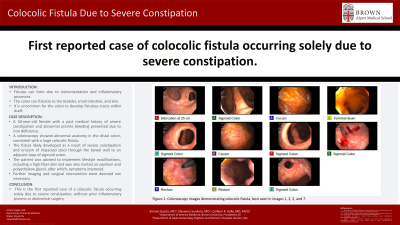Tuesday Poster Session
Category: Colon
P3134 - Colocolic Fistula Due to Severe Constipation
Tuesday, October 24, 2023
10:30 AM - 4:00 PM PT
Location: Exhibit Hall

Has Audio

Simran Gupta, MD
Brown University
Providence, RI
Presenting Author(s)
Simran Gupta, MD1, Naveena Sunkara, MD2, Colleen R. Kelly, MD, FACG3
1Brown University, Providence, RI; 2Warren Alpert Medical School, Brown University, Providence, RI; 3Alpert School of Medicine of Brown University, Providence, RI
Introduction: With instrumentation and inflammatory processes, the colon can fistulize to other parts of the body, including the bladder, small intestine, and skin. Uncommonly, the colon may develop fistulous tracts within itself, resulting in colocolic fistulas. We present a case of colocolic fistula in a patient with severe chronic constipation.
Case Description/Methods: A 50-year-old female with a past medical history of severe constipation and abnormal uterine bleeding presented for evaluation of iron deficiency. The patient had an extensive history of severe, lifelong constipation. She had previously been hospitalized during a prior pregnancy due to lower abdominal pain, which was determined to be due to obstipation. The patient underwent a colonoscopy which showed abnormal anatomy in the distal colon, consistent with a large colocolic fistula, likely a result of severe constipation and erosion of impacted stool through the bowel wall to an adjacent loop of sigmoid colon. The patient was advised to implement lifestyle modifications, including eating a diet high in fiber and fresh foods. She also incorporated psyllium and polyethylene glycol into her daily bowel regimen. All of these measures improved her symptoms, and after shared decision making, it was decided that further imaging or surgical intervention was not necessary. Ultimately, her iron deficiency was deemed to be likely secondary to her abnormal uterine bleeding that is being managed by OBGYN.
Discussion: Colocolic fistulas are uncommon. When present, however, they are usually secondary to an inflammatory condition such as inflammatory bowel disease or instrumentation such as intrauterine device migration. Our case is the first reported case of a colocolic fistula occurring solely due to severe chronic constipation in a patient without prior inflammatory bowel disease or abdominal surgery. While our patient does have an IUD in place, it was in the proper position and was non-contributory to colocolic fistula formation.

Disclosures:
Simran Gupta, MD1, Naveena Sunkara, MD2, Colleen R. Kelly, MD, FACG3. P3134 - Colocolic Fistula Due to Severe Constipation, ACG 2023 Annual Scientific Meeting Abstracts. Vancouver, BC, Canada: American College of Gastroenterology.
1Brown University, Providence, RI; 2Warren Alpert Medical School, Brown University, Providence, RI; 3Alpert School of Medicine of Brown University, Providence, RI
Introduction: With instrumentation and inflammatory processes, the colon can fistulize to other parts of the body, including the bladder, small intestine, and skin. Uncommonly, the colon may develop fistulous tracts within itself, resulting in colocolic fistulas. We present a case of colocolic fistula in a patient with severe chronic constipation.
Case Description/Methods: A 50-year-old female with a past medical history of severe constipation and abnormal uterine bleeding presented for evaluation of iron deficiency. The patient had an extensive history of severe, lifelong constipation. She had previously been hospitalized during a prior pregnancy due to lower abdominal pain, which was determined to be due to obstipation. The patient underwent a colonoscopy which showed abnormal anatomy in the distal colon, consistent with a large colocolic fistula, likely a result of severe constipation and erosion of impacted stool through the bowel wall to an adjacent loop of sigmoid colon. The patient was advised to implement lifestyle modifications, including eating a diet high in fiber and fresh foods. She also incorporated psyllium and polyethylene glycol into her daily bowel regimen. All of these measures improved her symptoms, and after shared decision making, it was decided that further imaging or surgical intervention was not necessary. Ultimately, her iron deficiency was deemed to be likely secondary to her abnormal uterine bleeding that is being managed by OBGYN.
Discussion: Colocolic fistulas are uncommon. When present, however, they are usually secondary to an inflammatory condition such as inflammatory bowel disease or instrumentation such as intrauterine device migration. Our case is the first reported case of a colocolic fistula occurring solely due to severe chronic constipation in a patient without prior inflammatory bowel disease or abdominal surgery. While our patient does have an IUD in place, it was in the proper position and was non-contributory to colocolic fistula formation.

Figure: Images from patient's colonoscopy
(1) Bifurcation at 25cm
(2) Sigmoid colon
(3) Cecum
(4) Terminal ileum
(5) Sigmoid colon
(6) Cecum
(7) Sigmoid colon
(8) Sigmoid colon
(9) Rectum
(10) Rectum
(11) Sigmoid colon
(1) Bifurcation at 25cm
(2) Sigmoid colon
(3) Cecum
(4) Terminal ileum
(5) Sigmoid colon
(6) Cecum
(7) Sigmoid colon
(8) Sigmoid colon
(9) Rectum
(10) Rectum
(11) Sigmoid colon
Disclosures:
Simran Gupta indicated no relevant financial relationships.
Naveena Sunkara indicated no relevant financial relationships.
Colleen Kelly: Sebela Pharmaceuticals – Consultant.
Simran Gupta, MD1, Naveena Sunkara, MD2, Colleen R. Kelly, MD, FACG3. P3134 - Colocolic Fistula Due to Severe Constipation, ACG 2023 Annual Scientific Meeting Abstracts. Vancouver, BC, Canada: American College of Gastroenterology.
